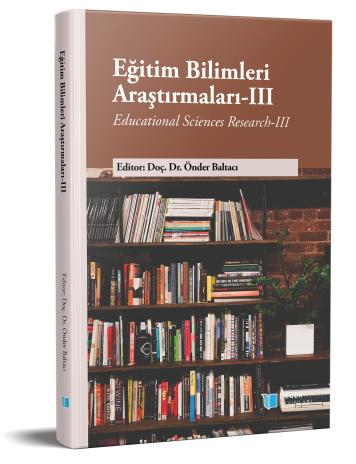
Ortaokul Öğrencilerinin Bilgi İşlemsel Düşünme Becerileri ile 21.Yüzyıl Becerileri Arasındaki İlişki
Şu kitabın bölümü:
Baltacı,
Ö.
(ed.)
2023.
Eğitim Bilimleri Araştırmaları- III.
Özet
Günümüz öğrencilerinin geleceğe güvenle hazırlanabilmesi için onlara farklı becerilerin kazandırılması gereklidir. 21.yy becerileri ve bilgi işlemsel düşünme becerileri bu beceriler arasında yer almaktadır. Bilgi işlemsel düşünme becerilerinin, 21.yüzyıl becerilerinin gelişmesine katkı sağladığına yönelik görüşler olmasına rağmen bu iki beceri seti arasında nasıl bir ilişki olduğu belirsizliğini korumaktadır. Bu çalışmada, ortaokul öğrencilerinin bilgi işlemsel düşünme becerileri ile 21.yüzyıl becerileri arasındaki ilişkinin incelenmesi amaçlanmıştır. Bir başka ifade ile 328 sekizinci sınıf öğrencisinin katılımıyla gerçekleştirilen ve ilişkisel tarama modelinde yürütülen bu araştırmada, ortaokul öğrencilerinin bilgi işlemsel düşünme becerileri ile 21.yüzyıl becerileri arasında bir ilişki olup olmadığı ve bilgi işlemsel düşünme becerilerinin 21.yüzyıl becerilerinin anlamlı bir yordayıcısı olup olmadığı incelenmiştir. Araştırmada “Bilgi İşlemsel Düşünme Ölçeği” ve “21.Yüzyıl Becerileri Ölçeği” ile elde edilen veriler, betimsel istatistikler, Pearson korelasyon katsayısı analizi ve çoklu doğrusal regresyon analizi ile analiz edilmiştir. Araştırma sonucunda, öğrencilerin bilgi işlemsel düşünme ve 21.yüzyıl becerilerine ilişkin algılarının yüksek olduğu, bilgi işlemsel düşünme becerileri ile 21.yüzyıl becerileri arasında pozitif yönde anlamlı bir ilişki olduğu bulunmuştur. Araştırmada ayrıca, bilgi işlemsel düşünme becerilerini oluşturan soyutlama, ayrıştırma, algoritmik düşünme, değerlendirme ve genelleme becerilerinin 21.yüzyıl becerilerini anlamlı derecede yordadıkları ve 21.yüzyıl becerilerindeki varyansın %72’sini açıkladıkları görülmüştür. Standardize regresyon katsayıları incelendiğinde, önem sırasına göre değerlendirme, algoritmik düşünme, genelleme, ayrıştırma ve soyutlama becerilerinin 21.yüzyıl becerilerinin anlamlı yordayıcıları olduğu sonucuna ulaşılmıştır.

